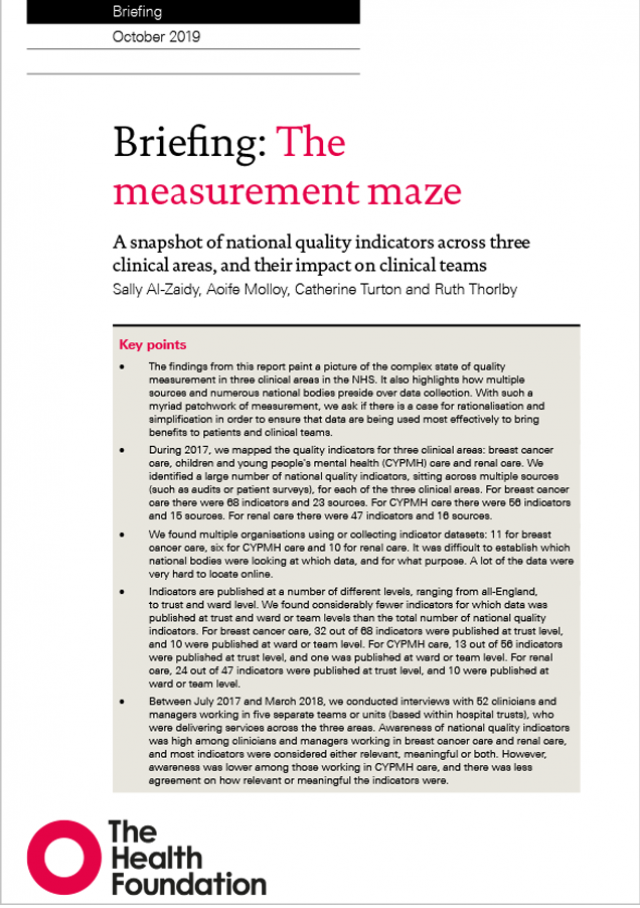The measurement maze
November 2019

Key points
-
Measurement in the NHS should contribute to driving improvement in quality of care but our analysis of three clinical areas suggests that in the NHS in England little insight from these measures is making its way to local clinical teams. Our analysis suggests there is untapped potential for making better use of national quality measures to support local clinical teams to improve services.
-
Given the volume of national indicators across multiple sources, and multiple national bodies sponsoring and using the data, there is a case for reviewing national quality measurement to make them more simple and streamlined. A more coherent national framework might need to articulate and differentiate more clearly between the different audiences for, and purposes of, quality measurement, with a greater focus on clinical teams.
-
The Long Term Plan for the NHS in England has added a new set of objectives for improving the quality of care, including for major diseases such as cancer, and cardiovascular and respiratory illnesses, and for population groups such as children and young people. The existing national framework for measuring quality may need to be simplified to avoid confusion and overload for clinical teams, regulators, commissioners, patients and the public alike.
-
Any approach to enabling more use of data for improving quality of care on a local level will need to consider the lack of analytical capacity within the NHS – the Health Foundation has identified gaps in training and development within analytical teams and the infrastructure to disseminate results.
The NHS is recognised as having led the way internationally for its policies to improve the quality of care over recent decades. These have resulted in an extensive and complex infrastructure of organisations and initiatives being involved in the measurement of care quality in England, at both a national and a local level.
This briefing takes a snapshot of national quality measures in three clinical areas with differing levels of national scrutiny – breast cancer, children and young people’s mental health (CYMPH), and renal care.
We’ve explored how many measures existed, who collected them and how frequently they were published. We’ve also interviewed managers and clinicians in these specialities to see if frontline staff were aware of the measures and if they used them to improve care.
A number of resources were compiled in relation to quality indicators for breast cancer care, children and young people’s mental health (CYMPH), and renal care as part of The measurement maze research. Through the qualitative aspect of the research it was ascertained that front-line clinicians and managers would find it useful to see a list of all the identified quality improvement indicators in one place. The lists of local quality indicators and missing indicators together give a richer picture of what is meaningful to clinical teams beyond the national-level indicators.
Cite this publication
Further reading
Work with us
We look for talented and passionate individuals as everyone at the Health Foundation has an important role to play.
View current vacanciesThe Q community
Q is an initiative connecting people with improvement expertise across the UK.
Find out more


